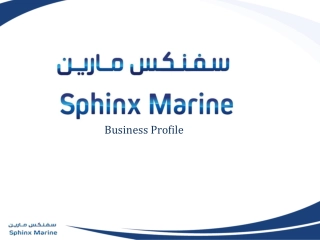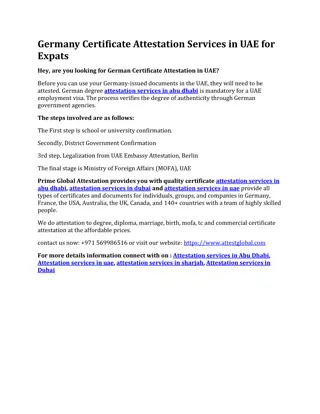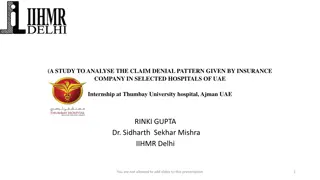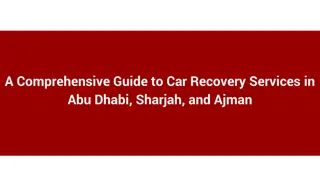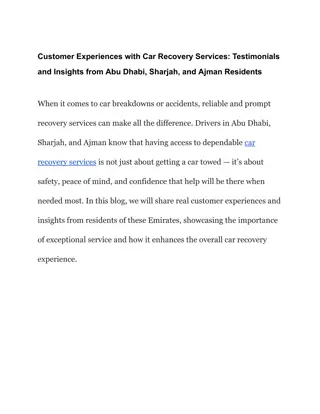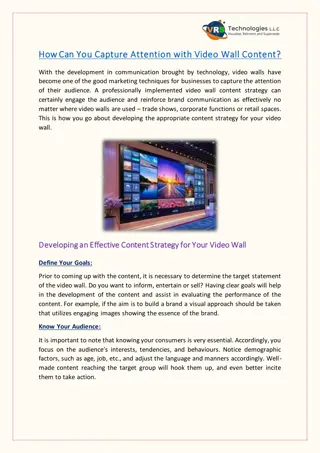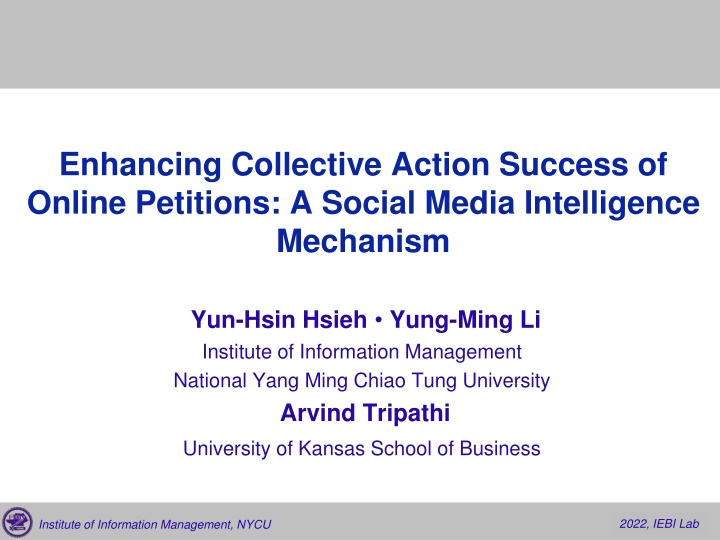
Enhancing Collective Action Success of Online Petitions Through Social Media Intelligence
This research explores mechanisms to predict and improve the success of online petitions by analyzing collective intelligence, human decision ingredients, and collaborative actions. Key areas of focus include increasing participation, understanding predictive factors, and developing an AI-driven approach for enhanced outcomes.
Download Presentation

Please find below an Image/Link to download the presentation.
The content on the website is provided AS IS for your information and personal use only. It may not be sold, licensed, or shared on other websites without obtaining consent from the author. If you encounter any issues during the download, it is possible that the publisher has removed the file from their server.
You are allowed to download the files provided on this website for personal or commercial use, subject to the condition that they are used lawfully. All files are the property of their respective owners.
The content on the website is provided AS IS for your information and personal use only. It may not be sold, licensed, or shared on other websites without obtaining consent from the author.
E N D
Presentation Transcript
Enhancing Collective Action Success of Online Petitions: A Social Media Intelligence Mechanism Yun-Hsin Hsieh Yung-Ming Li Institute of Information Management National Yang Ming Chiao Tung University Arvind Tripathi University of Kansas School of Business 2021, IEBI Lab 2022, IEBI Lab Institute of Information Management, NYCU
Human Decision Ingredients {Information, Belief} x {Interaction, Action} Collective Intelligence X Collective Action AI x Game theory Institute of Information Management, NYCU 2021, IEBI Lab 2022, IEBI Lab 2
Research in Collaborative Intelligence and Collective Actions Collective Intelligence Stock Market Prediction "A Social Investing Approach for Portfolio Recommendation with L.-F. Lin, C.-Y. Hsieh, and B.-S. Huang, Information & Management, 2021 (SSCI) Sport Betting Prediction Bitcoin Market Prediction Collective Action E-Commerce: Group-buying Analysis of Pricing Strategies for Community-based Group Buying:The impact of Competition and Waiting Time, with J.-H. Jhang-Li, T.-K. Hwang, P.-W. Chen, Information Systems Frontier, Vol. 14 (3), pp 633-645,2012 (SCI) "A Social Recommender Mechanism for Location-Based Group Commerce , with C.-L. Chou. and L.-F. Lin, Information Sciences, Vol. 274, pp 125-142, 2014 (SCI) Fintech: Crowdfunding "A Social Recommendation Approach for Reward-based Crowdfunding Campaigns with J. H. Liou, Y.-W. Li, Information & Management, Vol. 57 (7), 103246, 2020 (SSCI). "A Social Fundraising Mechanism for Charity Crowdfunding with J.D. Wu, C.Y. Hsieh, J. H. Liou, Decision Support Systems, Vol. 129, 113170, 2020 (SCI) Civic action: Online Petition Institute of Information Management, NYCU 2021,IEBI Lab 2022, IEBI Lab 3
Research Problems How to predict the success rate of an online petition case? How to increase participation in online petitions in order to enhance collective action success of online petitions? Institute of Information Management, NYCU 2021,IEBI Lab 2022, IEBI Lab 4
System Flow 2021,IEBI Lab 2022, IEBI Lab Institute of Information Management, NYCU 5
System Framework Institute of Information Management, NYCU 2021,IEBI Lab 2022, IEBI Lab 6
System Framework Institute of Information Management, NYCU 2021,IEBI Lab 2022, IEBI Lab 7
Data Construction Module Data Collection: Use crawlers & API to obtain data from two platforms. Change.org: The petition cases information on the Change.org platform. Twitter: The data include personal information, historical tweets, related tweets of petition cases and activists social relationship. Data Cleaning: Deleting missing value. Discard non-English petitions and tweets. Replace unreadable html elements, abbreviation terms, and contractions to their original terms. Institute of Information Management, NYCU 2021,IEBI Lab 2022, IEBI Lab 8
System Framework Institute of Information Management, NYCU 2021,IEBI Lab 2022, IEBI Lab 9
Petition Issue Classification Module To match the petition issue and user s preference. Tag feature vector representation (from document petition cases) Instead of counting the quantity of words in a document, the Term Frequency Inverse Document Frequency (TF-IDF) metric emphasizes the distinguishing words. ?t,? ???,? ??(?,?) = ? ??? ?,? = log 1 + | ? ? ? ? | ) ?? ??? ??,?,? = ?? ?,? ???(?,? Institute of Information Management, NYCU 2021,IEBI Lab 2022, IEBI Lab 10
Petition Issue Classification Module We utilized Latent Dirichlet Allocation (LDA), generative probabilistic model, to analyze the tags of petitions. Petition subjects and contents are handled as random mixtures of latent topics, with each topic characterized by a collection of word distributions. ? ?(?,?,? ?,?) = ?(? ?) ? ?? ? ? ?? ??,? ?=1 ? ?? ) ? ? , = ?(??|? ? ???|??? ???|???, ??? ?=1 ?=1 ??? Classify the petitions into each issue according to the corresponding score. Institute of Information Management, NYCU 2021,IEBI Lab 2022, IEBI Lab 11
System Framework Institute of Information Management, NYCU 2021,IEBI Lab 2022, IEBI Lab 12
Activists Preference Analysis Module Social Preference Analysis Use text mining to detect the explicit preferences of activists through their posts and profiles. For each activist, we classify each tweet (d) into each issue (ti) by our LDA model. ? ) ? ??? = ? ????= ? ?(??= ?|? ?=1 Calculate and normalize the number of tweets per activist for each issue. #Tweets(??,??????) ?=1 #Tweets(??,?????? ????????????????????,??????= ? Institute of Information Management, NYCU 2021,IEBI Lab 2022, IEBI Lab 13
Activists Preference Analysis Module Social Closeness Analysis To understand the degree of similarity between users, ????????????? ??,?? and ??????????????? ??,??denote the similarity of activists. ????????????? ??,?? = ????????????? ??,?? + ??????????????? ??,?? Here we can determine who has the highest influence rate to an activist, and we set different weights ??to measure an activist s potential preference scores for every issue. ? ??????????????????? ??,?????? = ?????????????????? ??,?????? ?? ?=1 ) ?????????????????? ??,?????? = ? ??? ??,?????? + 1 ? ???(??,?????? Institute of Information Management, NYCU 2021,IEBI Lab 2022, IEBI Lab 14
System Framework Institute of Information Management, NYCU 2021,IEBI Lab 2022, IEBI Lab 15
Social Media Intelligence Analysis Module Social Coverage Analysis Count the number of individuals who have mentioned the specific online petitions, including their URLs and hashtags. #???????????????(??) ??? ??????????????? ??? ??????????????? ??? ??????????????? ????????????? ?? = For each post, retweet time and comments time are considered.. Engagement(t_i )=#Retweet(t_i )+#Comment(t_i) For each petition, we add up all engaged tweets count as ??????????????? ??, and normalize into ?????????? ??. ??????????????????? ?? = ????????????? ?? + ?????????? ?? Institute of Information Management, NYCU 2021,IEBI Lab 2022, IEBI Lab 16
Social Media Intelligence Analysis Module Social Sentiment Analysis We measured posts about the petitions on social media platform with sentimental analysis to determine the positive rate of each word to assess the posts emotional content. The social sentiment score of a petition ??is calculated by the sum of sentiment score of each post. ? ???????????????????? ?? = ?=1 ?????????????? ?? ? Last, we conclude ??? ?? for each petition. ??? ?? = ??????????????????? ?? + (1 + ???????????????????? ??) Institute of Information Management, NYCU 2021,IEBI Lab 2022, IEBI Lab 17
System Framework Institute of Information Management, NYCU 2021,IEBI Lab 2022, IEBI Lab 18
Petition Case Analysis Module Petition Information Analysis We can suppose that: (Y. Chen et al. 2019) 1. Online content with strong positive emotional appeals positively influences their success. 2. Cognitive cues in the texts of online petitions positively influence their success. 3. Moral cues in the texts of online petitions negatively influence their success. Calculate petition s positive words, cognitive words, and moral words, and conclude them into a ?????????????????? score. ?????????????????? ?? = 1 + ??????????? ?? + ????????????? ?? ?????????(?? ) Institute of Information Management, NYCU 2021,IEBI Lab 2022, IEBI Lab 19
Petition Case Analysis Module Petition Information Analysis Capture each petition s update time to calculate the frequency of updating petitions. ?????????????????(??) specifies how frequently the petition should be updated. ?? ???????= 0 ???????(?? ???????????? ???????????(?? ???????(?? ???????????? ???????????? 0, , ?? ???????= 1 ) ????????????????? ?? = , ?? ???????> 1 ????????????? ?? = ?????????????????? ?? 1 + ????????????????? ?? Institute of Information Management, NYCU 2021,IEBI Lab 2022, IEBI Lab 20
Petition Case Analysis Module Petition Comment Analysis When signers finish signing, the petition can share their reasons for signing. In this step, we calculate number of comments, their sentimental scores, and number of like from them as ??????????????? ?? ? ??????????? ?? = ?=1 ??????????????? ?? ? Conclude a score representing the quality of information that the online petition gives to activists and normalize to ??? ??. ????????????????? ?? = ????????????? ?? + ??????????? ?? Institute of Information Management, NYCU 2021,IEBI Lab 2022, IEBI Lab 21
System Framework Institute of Information Management, NYCU 2021,IEBI Lab 2022, IEBI Lab 22
Online Petition Cases Recommendation Module Success Rate Computing Use machine learning methods to predict the success rate of ??based on the scores that we generated from modules 3.2-3.5 ??????????? ?? = ??????????? ?? ???????? ??????? ?? ????? , 0,1 Use precision, recall, F1-score, and AUC score from confusion matrix to determine the model's performance. Petition List Recommendation ????????? ??,?? = ? ?????????????????? ??,?? + (1 ?) ??????????? ?? ? ??? 0 < ? < 1 Institute of Information Management, NYCU 2021,IEBI Lab 2022, IEBI Lab 23
Data Construction Module Online petition platform: Change.org Social media platform: Twitter Data Collection method : Twitter API, Python Crawler The Information of datasets 7,720 Number of activists 373 Number of petitions Activists pairs Number for signing of reasons 264,084 69,378 (36,594) (friendship pairs) Number of activists historical tweets Number of petition related tweets 112,407 399,978 Institute of Information Management, NYCU 2021,IEBI Lab 2022, IEBI Lab 24
Issue Classification Module Utilize LDA method to classify online petition cases into 12 types of issues. Topic Issue Name Topic 0 Sustainable Food Topic 1 Justice Topic 2 Human Rights Topic 3 Education Topic 4 Gay Rights Topic 5 Health Topic Topic 6 Topic 7 Topic 8 Topic 9 Topic 10 Topic 11 Issue Name Government Criminal COVID-19 Women s Rights Environment Economic Institute of Information Management, NYCU 2021,IEBI Lab 2022, IEBI Lab 25
Online Petition Cases Recommendation Module Success Rate Computing Machine learning methods: XGBoost, logistic regression, KNN, and multinomial Na ve Bayes Use precision, recall, F1-score, and AUC score from confusion matrix to determine the model's performance. We use XGBoost to predict success rate of petitions. Petition List Recommendation The activist preference scores of each activist were combined to generate a list of online petition cases and recommended to activists. Activist dealzcard HumphreyKissa sasosway #1 #2 #3 16346447 28429910 24641578 17647609 31866145 24677017 23075278 27333238 29425665 Institute of Information Management, NYCU 2021,IEBI Lab 2022, IEBI Lab 26
Evaluation of Different Machine Learning Algorithms Accuracy Precision Recall F1-score AUC Multinomial Na ve Bayes Logistic Regression KNN XGBoost 0.8089 0.75 0.2245 0.3455 0.739 0.8104 0.7091 0.2653 0.3861 0.792 0.8226 0.8945 0.7541 0.7826 0.3129 0.7347 0.4423 0.7579 0.818 0.908 Comparison of Machine Learning Models 1 0.9 0.8 0.7 0.6 0.5 0.4 0.3 0.2 0.1 0 Multinomial Na ve Bayes Logistic Regression KNN XGBoost F1-Score AUC Institute of Information Management, NYCU 2021,IEBI Lab 2022, IEBI Lab 27
Evaluation of Different Modules for Petition Success Prediction Accuracy Precision Recall F1-score AUC Issue-based 0.8089 0.75 0.2245 0.3455 0.715 Petition-based 0.8532 0.9474 0.3673 0.5294 0.886 SMI 0.8823 0.8125 0.6190 0.7027 0.890 IPSMI (Ours) 0.8945 0.7826 0.7347 0.7579 0.908 Comparison of Different Modules 1 0.9 0.8 0.7 0.6 0.5 0.4 0.3 0.2 0.1 0 Issue-based Petition-based SMI IPSMI F1-Score AUC Institute of Information Management, NYCU 2021,IEBI Lab 2022, IEBI Lab 28
Evaluation of Recommendation List Percentage of successful case We assume that everyone will sign our recommended petition cases, and then calculate the percentage of recommended top-N cases that are actually successful. ??? = ?=1 ? ?????????? ?? ?????? ?????????? ????????@? #????????? Catalog coverage The term coverage was related to the concept of catalog coverage, which is the percentage of available goods that are effectively ever recommended to a user. (M. Ge et al. 2010) ??=1 ??? ? ? =#????? ???? ??????????? ?? ????????? #????? ?? ??????? ??????? ???????? = Diversity Low diversity recommender would recommend only the same titles or issues. On the other hand, the higher diversity means our recommendation lists with great variety. (T. Silveira et al. 2019) ????????? = 1 ???(???@? ) Institute of Information Management, NYCU 2021,IEBI Lab 2022, IEBI Lab 29
Evaluation of Recommendation List Evaluation of Different Method Approach (PSC) PSC@10 0.767 PSC @20 0.824 PSC @30 0.761 PSC @40 0.768 Issue-based Issue-based Petition-based IPSMI + 0.847 0.863 0.883 0.900 0.900 0.913 0.918 0.883 PSC of Different Hybrid Approaches 0.95 0.9 0.85 0.8 0.75 0.7 0.65 0.6 Issue-based Issue-based + Petition-based IPSMI Top-10 Top-20 Top-30 Top-40 Institute of Information Management, NYCU 2021,IEBI Lab 2022, IEBI Lab 30
Evaluation of Recommendation List Evaluation of Different Method Approach (Coverage and Diversity) Coverage @10 Coverage @20 Coverage @30 Coverage @40 Diversity @10 Diversity @20 Diversity @30 Diversity @40 Issue-based Issue-based Petition-based IPSMI (Ours) 0.02721 0.02714 0.02718 0.02700 Issue-based Issue-based Petition-based IPSMI (Ours) 0.088 0.107 0.111 0.112 + + 0.5723 0.5007 0.4644 0.4586 0.004 0.006 0.008 0.009 0.012 0.017 0.021 0.025 0.6463 0.6589 0.6751 0.6773 Coverage of Different Hybrid Approaches Diversity of Different Approaches 0.12 0.8 0.7 0.1 0.6 0.08 0.5 0.06 0.4 0.3 0.04 0.2 0.02 0.1 0 0 Issue-based Issue-based + Petition- based IPSMI Issue-based Issue-based + Petition- based IPSMI Top-10 Top-20 Top-30 Top-40 Top-10 Top-20 Top-30 Top-40 Institute of Information Management, NYCU 2021,IEBI Lab 2022, IEBI Lab 31
Thank you for your listening! Q&A Institute of Information Management, NYCU 2021,IEBI Lab 2022, IEBI Lab 32

